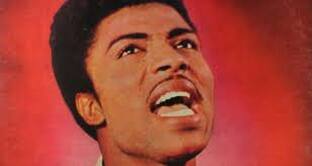Richard Wayne Penniman (December 5, 1932 – May 9, 2020), better known as Little Richard, was an American singer, songwriter, and musician. An influential figure in popular music and culture for seven decades, he was nicknamed "The Innovator", "The Originator", and "The Architect of Rock and Roll". Penniman's most celebrated work dates from the mid-1950s, when his charismatic showmanship and dynamic music, characterized by frenetic piano playing, pounding backbeat and raspy shouted vocals, laid the foundation for rock and roll. His innovative emotive vocalizations and uptempo rhythmic music also played a key role in the formation of other popular music genres, including soul and funk. He influenced numerous singers and musicians across musical genres from rock to hip hop; his music helped shape rhythm and blues for generations to come.
"Tutti Frutti" (1955), one of Penniman's signature songs, became an instant hit, crossing over to the pop charts in both the United States and the United Kingdom. His next hit single, "Long Tall Sally" (1956), hit No. 1 on the Billboard Rhythm and Blues Best-Sellers chart, followed by a rapid succession of 15 more hit singles in less than three years. His performances during this period resulted in integration between White Americans and African Americans in his audience. In 1962, during a five-year period in which Penniman abandoned rock and roll music for born-again Christianity, concert promoter Don Arden persuaded him to tour Europe. During this time, Arden had the Beatles open for Penniman on some tour dates, capitalizing on his popularity. Penniman advised them on how to perform his songs and taught the band's member Paul McCartney his distinctive vocalizations.
Penniman is cited as one of the first crossover black artists, reaching audiences of all races. His music and concerts broke the color line, drawing blacks and whites together despite attempts to sustain segregation. His contemporaries, including Elvis Presley, Buddy Holly, Bill Haley, Jerry Lee Lewis, the Everly Brothers, Gene Vincent and Eddie Cochran, all recorded covers of his works. Taken by his music and style, and personally covering four of Penniman's songs on his own two breakthrough albums in 1956, Presley told Penniman in 1969 that his music was an inspiration to him and that he was "the greatest".
Penniman was honored by many institutions. He was inducted into the Rock and Roll Hall of Fame as part of its first group of inductees in 1986. He was also inducted into the Songwriters Hall of Fame. He was the recipient of a Lifetime Achievement Award from the Recording Academy and a Lifetime Achievement Award from the Rhythm and Blues Foundation. In 2015, Penniman received a Rhapsody & Rhythm Award from the National Museum of African American Music for his key role in the formation of popular music genres and helping to bring an end to the racial divide on the music charts and in concert in the mid-1950s, changing American culture significantly. "Tutti Frutti" was included in the National Recording Registry of the Library of Congress in 2010, which stated that his "unique vocalizing over the irresistible beat announced a new era in music".
| |

